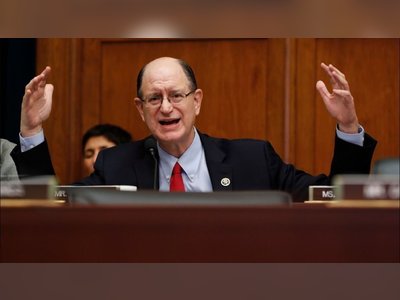
Political Storm: Rishi Sunak's Absence at D-Day Commemorations Threatens Conservative Party's Election Campaign
British Prime Minister Rishi Sunak's early departure from D-Day commemorations in northern France has sparked controversy and criticism, with some viewing it as a disrespectful snub to veterans and a diminishment of the UK's international standing.
Sunak apologized for missing the final commemoration on Omaha Beach but was criticized by opposition leader Keir Starmer and other world leaders who attended, including President Joe Biden, French President Emmanuel Macron, and German Chancellor Olaf Scholz.
With the Conservatives trailing in opinion polls ahead of the July 4 general election, Sunak's absence has raised concerns that the party's support may further erode.
In the given text, the focus is on notable campaign blunders in British elections.
Two significant instances are highlighted:
1.
In 1974, Conservative Prime Minister Ted Heath called for an early election despite economic hardships, including the aftermath of the Yom Kippur war and the miners' strike.
He sought a mandate to control trade unions, but the public did not support him, and Labour's Harold Wilson was re-elected.
2.
In 1983, following the Falklands War victory, Conservative Prime Minister Margaret Thatcher was expected to win the general election she called for.
However, the campaign was marred by the controversial decision to sell council houses, which was unpopular with many voters.
Labour still suffered heavy losses but managed to increase their number of seats.
Both instances demonstrate how campaign gaffes or misjudgments can significantly impact election outcomes.
In the given text, it is described how Margaret Thatcher's victory in the UK general election of 1983 became almost certain after Labour Party published an extreme left-wing manifesto with funding through higher taxes and policies like unilateral nuclear disarmament and withdrawal from the European Economic Community.
This manifesto was criticized as a "longest suicide note in history" by a moderate Labour member.
Thatcher won a landslide and remained in power until 1990.
After Labour's big defeat in 1983, they tried to move back to the center under Neil Kinnock's leadership, and by the time of the 1992 election called by John Major, Labour was once again a contender.
In the week before the 2001 UK elections, opinion polls indicated that Labour was likely to be the largest party, though not necessarily winning outright.
A rally in Sheffield was held with an optimistic atmosphere, reminiscent of US presidential elections.
Labour leader Neil Kinnock was perceived as overconfident during his speech, shouting phrases like "We're alright!" or "Well alright," which was seen as a reason for Labour's unexpected loss to the Conservatives.
The election was initially expected to be a landslide victory for Tony Blair's Labour Party, but it was delayed due to an outbreak of foot and mouth disease.
Ultimately, the election was considered boring compared to previous postwar elections.
In the given text, it is mentioned that during Tony Blair's tenure as Prime Minister, an unexpected incident occurred when his deputy, John Prescott, punched a man with a mullet hairdo after being egged on the campaign trail.
This incident threatened to derail Labour's campaign but was defused by Blair at a press conference with his famous remark, "John is John."
Later, during Gordon Brown's time as Prime Minister in 2010, his lack of natural communications skills became evident during the election campaign.
With Labour's ratings and those of Brown collapsing due to the global financial crisis, the party faced losing the May election.
In the final week of the campaign, Brown had an encounter with a 65-year-old woman named Gillian Duffy while canvassing.
She questioned him about the economy and immigration policies.
Following their conversation, Brown described her as a "bigoted woman" to his advisers while still being filmed by Sky News.
This comment caused controversy and negatively impacted Brown and Labour's campaign.
In 2016, a gaffe during the Conservative Party campaign led to a coalition arrangement between the Conservatives and Liberal Democrats, as they failed to win an outright majority.
In 2017, Theresa May, who succeeded David Cameron after his resignation following the Brexit referendum, called for an early general election to secure a bigger majority and better negotiating power in Brexit discussions.
However, her proposal to change the way retirees pay for long-term care, known as the "dementia tax," was criticized and led to her losing the Conservative Party's majority instead.
The text refers to a female political leader who faced difficulties in her role as prime minister.
Her tenure was unsuccessful, and she was ultimately replaced by Boris Johnson after two years in office.
With the Conservatives trailing in opinion polls ahead of the July 4 general election, Sunak's absence has raised concerns that the party's support may further erode.
In the given text, the focus is on notable campaign blunders in British elections.
Two significant instances are highlighted:
1.
In 1974, Conservative Prime Minister Ted Heath called for an early election despite economic hardships, including the aftermath of the Yom Kippur war and the miners' strike.
He sought a mandate to control trade unions, but the public did not support him, and Labour's Harold Wilson was re-elected.
2.
In 1983, following the Falklands War victory, Conservative Prime Minister Margaret Thatcher was expected to win the general election she called for.
However, the campaign was marred by the controversial decision to sell council houses, which was unpopular with many voters.
Labour still suffered heavy losses but managed to increase their number of seats.
Both instances demonstrate how campaign gaffes or misjudgments can significantly impact election outcomes.
In the given text, it is described how Margaret Thatcher's victory in the UK general election of 1983 became almost certain after Labour Party published an extreme left-wing manifesto with funding through higher taxes and policies like unilateral nuclear disarmament and withdrawal from the European Economic Community.
This manifesto was criticized as a "longest suicide note in history" by a moderate Labour member.
Thatcher won a landslide and remained in power until 1990.
After Labour's big defeat in 1983, they tried to move back to the center under Neil Kinnock's leadership, and by the time of the 1992 election called by John Major, Labour was once again a contender.
In the week before the 2001 UK elections, opinion polls indicated that Labour was likely to be the largest party, though not necessarily winning outright.
A rally in Sheffield was held with an optimistic atmosphere, reminiscent of US presidential elections.
Labour leader Neil Kinnock was perceived as overconfident during his speech, shouting phrases like "We're alright!" or "Well alright," which was seen as a reason for Labour's unexpected loss to the Conservatives.
The election was initially expected to be a landslide victory for Tony Blair's Labour Party, but it was delayed due to an outbreak of foot and mouth disease.
Ultimately, the election was considered boring compared to previous postwar elections.
In the given text, it is mentioned that during Tony Blair's tenure as Prime Minister, an unexpected incident occurred when his deputy, John Prescott, punched a man with a mullet hairdo after being egged on the campaign trail.
This incident threatened to derail Labour's campaign but was defused by Blair at a press conference with his famous remark, "John is John."
Later, during Gordon Brown's time as Prime Minister in 2010, his lack of natural communications skills became evident during the election campaign.
With Labour's ratings and those of Brown collapsing due to the global financial crisis, the party faced losing the May election.
In the final week of the campaign, Brown had an encounter with a 65-year-old woman named Gillian Duffy while canvassing.
She questioned him about the economy and immigration policies.
Following their conversation, Brown described her as a "bigoted woman" to his advisers while still being filmed by Sky News.
This comment caused controversy and negatively impacted Brown and Labour's campaign.
In 2016, a gaffe during the Conservative Party campaign led to a coalition arrangement between the Conservatives and Liberal Democrats, as they failed to win an outright majority.
In 2017, Theresa May, who succeeded David Cameron after his resignation following the Brexit referendum, called for an early general election to secure a bigger majority and better negotiating power in Brexit discussions.
However, her proposal to change the way retirees pay for long-term care, known as the "dementia tax," was criticized and led to her losing the Conservative Party's majority instead.
The text refers to a female political leader who faced difficulties in her role as prime minister.
Her tenure was unsuccessful, and she was ultimately replaced by Boris Johnson after two years in office.
Translation:
•
Translated by AI











